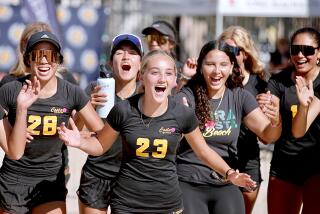Shifting Sands Bring Volleyball to Tennis Center
- Share via
Tennis fans can start breathing again.
Those truckloads of 2,500 tons of Simi Valley sand headed toward UCLA on Tuesday and deposited at the L.A. Tennis Center don’t mean the men’s tournament has gone the way of the French Open.
The Tennis Center’s make-over--a three-day process involving double-bed trucks ferrying 102 loads of sand--involves not only a surface change, but a changeover to another sport: beach volleyball.
Which means the beach is moving inland a few miles for the first World Championships of Beach Volleyball, Sept. 10-13 at UCLA. Prize money of $600,000 will be divided equally among men’s and women’s two-player teams.
So, why isn’t the sand-breaking event of beach volleyball not at the beach?
“Nobody has really asked me the question,” co-promoter Leonard Armato said.
“If you trace the history of sports--it originates somewhere and it has ended up someplace else. Football started on sandlots. . . . Sport ends up where it didn’t start. To get to the highest level, you’ve got to be able to make it accessible to fans, media and sponsors.
“We wanted to find a venue that could showcase the sport.”
Although landlocked beach volleyball may seem an aberration in beach-conscious Southern California, it is a way of life on the Assn. of Volleyball Professionals (AVP) tour. Events have been held at such incongruous places as the parking lot of the ski resort at Vail, Colo., and a softball complex at Indianapolis.
This particular event represents at least temporary unity in the fractured, alphabet soup world of beach volleyball. It is sanctioned by the Federation Internationale de Volleyball (FIVA) and bolstered by the participation of teams from FIVA, AVP and the Women’s Professional Volleyball Assn (WPVA).
Quite clearly, the 1996 Olympics was the major catalyst for the tournament here. At the beach volleyball venue in Jonesboro, Ga., Armato sat courtside with FIVB President Ruben Acosta during the legendary match between beach superstars Karch Kiraly and Sinjin Smith, in which Kiraly and partner Kent Steffes beat Smith and Carl Henkel, 17-15, to gain a berth in the semifinals. Kiraly and Steffes went on to win the gold medal.
There was no bolt of lightning from the sky but Armato and Acosta quickly realized that the opportunity presented by the successful Olympic event was too good to be squandered through political infighting.
More to Read
Go beyond the scoreboard
Get the latest on L.A.'s teams in the daily Sports Report newsletter.
You may occasionally receive promotional content from the Los Angeles Times.











